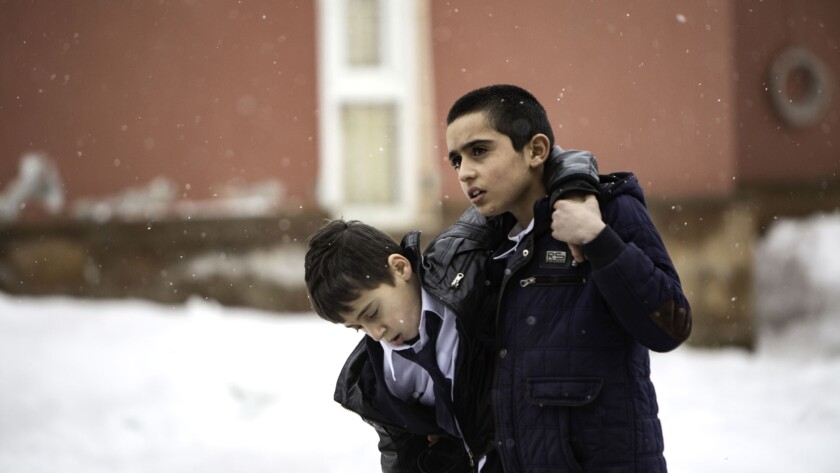Bryn Chiappe explores the Darwinian environment of boarding school portrayed in this intricate Turkish drama.
The entirety of Brother’s Keeper takes place at an isolated boarding school nestled among the mountains of Eastern Anatolia. Yusuf and Mehmet are students and the school, and close friends from the same village. Mehmet falls ill, and Yusuf attempts to get him the necessary medical help. This pursuit is continually embroiled in the web of bureaucracy and self-interest that defines the school, and all the while Mehmet’s condition grows worse.
It can often feel as though single-location films are only made in such a way because of the absence of a large budget, and can give a feature film the undesirable tonal quality of a bottle episode. In the case of Brother’s Keeper, however, writer-director Ferit Karahan has impressively constructed a story that relies on its location to function and thrive, while shooting the film in such a fashion as to prevent the viewer from questioning whether the script was more suited to the anchored location of a theatre. The boarding school functions as a microcosm of the wider nation, and although it’s hardly an original move to investigate the parallel between the authority of the state over its people and that of teachers over their pupils, it’s a parallel that will remain relevant for as long as the two remain as intertwined as they are. The isolated location works twofold, birthing the plot in its prevention of a straightforward solution to getting an ambulance to Mehmet, and creating the toxic atmosphere that provides the film’s political commentary and sustains the storyline.

The school’s existence as a pocket of civilisation in the depths of a harsh natural world results in a heightening of the power dynamic between teachers and students until the disparity is even greater than in an ordinary school environment. Power is held primarily by the corrupt and negligent principal, but the value given to serving one’s own interests and exercising dominance wherever possible trickles down to every character in the film. There are some interesting analogies made between the petty playground methods of control used by the boys, the teachers, and in a wider sense, the state. Constant teasing and squabbling are most acutely found amongst the boys, but the source of influence becomes clear as the teachers reveal their true colours, punishing those who misbehave with childish glee and pointing fingers at each other as culpability for Mehmet’s condition comes into question. There are several parallels between the children’s behaviour and that of the state, although it’s unclear whether these are overt instances of Karahan trying to demonstrate his political beliefs, or rather just universal truths about the similarities of human behaviour across age and power ranges. One example of this is the deliberate blurring of the line between fact and fiction in order to deflect responsibility and retain the validity of one’s status as empowered. A urine-soaked blanket is moved from bed to bed as the boys struggle to avoid being labelled as the one who wet himself, and shortly afterwards the curriculum teaches them that there is not, and never was, “such thing as the Kurdish region”.
Although for the most part the teaching faculty are defined by negative qualities – reaching their pinnacle in the principle – there is some hope offered by the grammar teacher who takes a genuine interest in the wellbeing of the boys and seems determined to get Mehmet medical support for reasons other than merely saving his own job. Although the children also participate in the brutal, dog-eat-dog behaviour that characterises the school, Brother’s Keeper is very much concerned with pushing the belief that this behaviour is a case of corrupted morals forced onto the blank state of inherent goodness that children represent. Following a long history of art concerning children, back to Rousseau’s Emile, Or Treatise on Education, the film upholds the sanctity of childhood and rejects a Lord of the Flies thesis suggesting the existence of an appetite for evil lurking in every human heart. For works like Brother’s Keeper, it is toxic environments that poison the souls of children, who then grow up to become adults that foster a continuation of the same environments. Or so the theory goes. A vicious cycle with no end in sight.

Stories, for the most part, can only hope to diagnose the symptoms of society’s ills, rather than offer solutions to them. Karahan’s film is very clear in its desire to remain in this zone, mounting a thorough investigation of the causes and effects of totalitarian, bureaucratised society without attempting to stretch itself too thin by offering anything more uplifting than its solidarity. Whilst this is admirable, the fact that the film is merely reinforcing a relatively simple point does grow to become something of an issue by its end. It’s not that the point it’s making is wrong, or even oversimplified, but more that it is a single note being hit, again and again, meaning that as the film progresses, scenes demonstrating a powerful point about the abuse of power are not as potent as they could be in a story with more tonal shifts. Brother’s Keeper a very short film, so while I cannot say that I got bored during its eighty-five-minute runtime, it is certainly the case that the film is a Kafkaesque story without the absurdity present in Kafka’s writing, and therefore finds itself more a replication of than a response to the repetitive, dull nature of bureaucracy.




